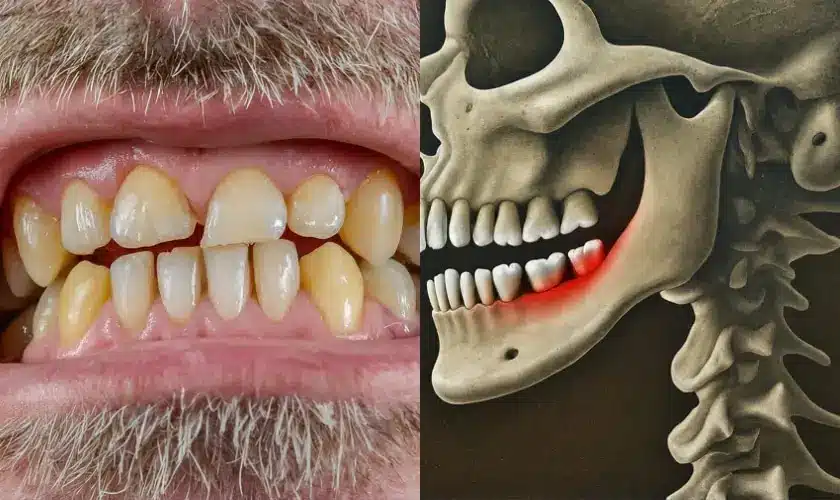What Is Teeth Grinding (Bruxism)?
Effect of Teeth Grinding on Gums
Teeth grinding, medically known as bruxism, is an involuntary habit that many people engage in, often during sleep. While it may seem harmless at first, bruxism can lead to a series of dental problems and significantly affect your overall oral health. The condition occurs when a person clenches their teeth or grinds them back and forth, usually as a response to stress, anxiety, or other underlying issues such as sleep disorders.
Bruxism can be subtle, so many people don’t realize they are doing it. Over time, however, the damage caused by excessive grinding can lead to more serious dental problems, such as tooth wear, gum recession, and bone loss.
In this article, we will explore the effect of teeth grinding on gums and bones, the potential complications, and the best treatments available to protect your oral health read more.
How Teeth Grinding Affects the Gums
Teeth grinding, when left unchecked, can have a significant impact on the gums. The constant pressure exerted on the teeth during grinding can cause the gums to recede, leading to a variety of issues, including:
Gum Recession
One of the most commonEffect of teeth grinding on gums is gum recession. When grinding your teeth, the gums around the teeth become irritated and start to pull away from the teeth, causing them to become exposed. This can lead to several problems, such as:
- Increased Tooth Sensitivity: Exposing the tooth roots can make them more sensitive to hot, cold, or sweet foods and drinks.
- Higher Risk of Cavities: The exposed areas of the teeth are more susceptible to cavities since the protective enamel layer is worn down.
Inflammation and Infection
The constant grinding pressure on the teeth and gums can cause inflammation in the gum tissues. This inflammation can result in redness, swelling, and tenderness, making your gums more vulnerable to infection. Gum infections can lead to more serious complications, such as abscesses or even systemic infections if left untreated.
Increased Risk of Gum Disease
As the gums recede, they become less effective at protecting the underlying structures of the teeth. This leaves you at a greater risk of developing gum disease, which can progress to more serious conditions like periodontitis if not addressed. Gum disease can ultimately lead to tooth loss, which is why it’s essential to manage bruxism and protect your gums.

How Teeth Grinding Affects the Bones
While gum damage is significant, Effect of teeth grinding on gums extend beyond the gums. The bones that support your teeth can also be affected by the constant pressure from grinding. The potential issues include:
Tooth Damage and Wear
The grinding of teeth can lead to severe tooth wear over time. This wear can cause the following problems:
- Chipped or Cracked Teeth: The constant grinding forces can cause your teeth to crack or chip, especially if they are already weakened.
- Flattened Teeth: Over time, the grinding action can flatten the biting surfaces of your teeth, making it harder to chew food properly and potentially causing discomfort when eating.
- Tooth Loss: In extreme cases, if grinding is not addressed, it can lead to tooth loss. The damage can weaken the teeth so much that they may eventually fall out or need to be extracted by a dentist.
Jawbone Loss
When teeth grind against each other, the force exerted can affect the jawbone. The jawbone supports your teeth, so any damage or stress on this area can have long-term consequences, such as:
- Bone Resorption: This is the process by which bone tissue is broken down and absorbed by the body. With constant pressure from bruxism, the jawbone may begin to deteriorate, leading to a weakened structure.
- Tooth Mobility: As the jawbone weakens, the teeth may become loose, which could eventually lead to tooth loss if not managed.
Temporomandibular Joint (TMJ) Problems
Bruxism can also place excessive pressure on the temporomandibular joint (TMJ), the joint that connects the jaw to the skull. This can lead to issues such as:
- Jaw Pain: The stress on the TMJ can cause pain and stiffness in the jaw, especially in the morning when you first wake up.
- Clicking or Popping Sounds: The TMJ may make clicking or popping sounds as you open or close your mouth, indicating a potential issue with the joint.
- Difficulty in Opening or Closing the Mouth: If left untreated, TMJ problems can make it painful or difficult to fully open or close your mouth, affecting daily activities like eating and speaking.

Treatment Options for Teeth Grinding
If you are experiencing symptoms of bruxism, it is essential to seek treatment to prevent further damage to your teeth, gums, and bones. Here are some common treatment options:
Night Guards
One of the most effective treatments for bruxism is the use of night guards or mouthguards. These devices are designed to be worn at night and protect your teeth from the pressure of grinding. A custom-fitted night guard can help:
- Prevent tooth wear and damage
- Reduce the strain on the jaw and TMJ
- Alleviate the pain caused by grinding
A dentist can create a custom night guard that fits comfortably and provides optimal protection against grinding.
Stress Management
Since stress is a common trigger for bruxism, it is essential to address any underlying stressors that may be causing you to grind your teeth. Some ways to reduce stress include:
- Practicing relaxation techniques such as deep breathing or meditation
- Getting regular exercise to help relieve tension
- Seeking therapy or counseling to address anxiety or stress-related issues
In some cases, medication may be prescribed to help manage stress or anxiety, which can help reduce the occurrence of bruxism.
Dental Procedures
In severe cases of bruxism, dental procedures may be necessary to repair the damage caused by grinding. These may include:
- Crowns or Veneers: To restore damaged or worn-down teeth
- Root Canals: If the grinding has caused damage to the tooth pulp
- Periodontal Treatment: If gum disease has developed as a result of grinding
Your dentist can evaluate your situation and recommend the best course of action for restoring your oral health.

Prevention of Teeth Grinding
Preventing bruxism is important to avoid long-term damage to your teeth, gums, and bones. Some preventive measures include:
- Use a Night Guard: As mentioned earlier, wearing a custom-fitted night guard can help protect your teeth from grinding during sleep.
- Reduce Stress: Managing stress through relaxation techniques and healthy lifestyle choices can help prevent bruxism.
- Avoid Stimulants: Avoid consuming substances like caffeine and alcohol before bed, as they can increase the likelihood of grinding.
- Improve Sleep Hygiene: Getting enough rest and ensuring you have a relaxing bedtime routine can help reduce the chances of grinding your teeth during sleep read more.
